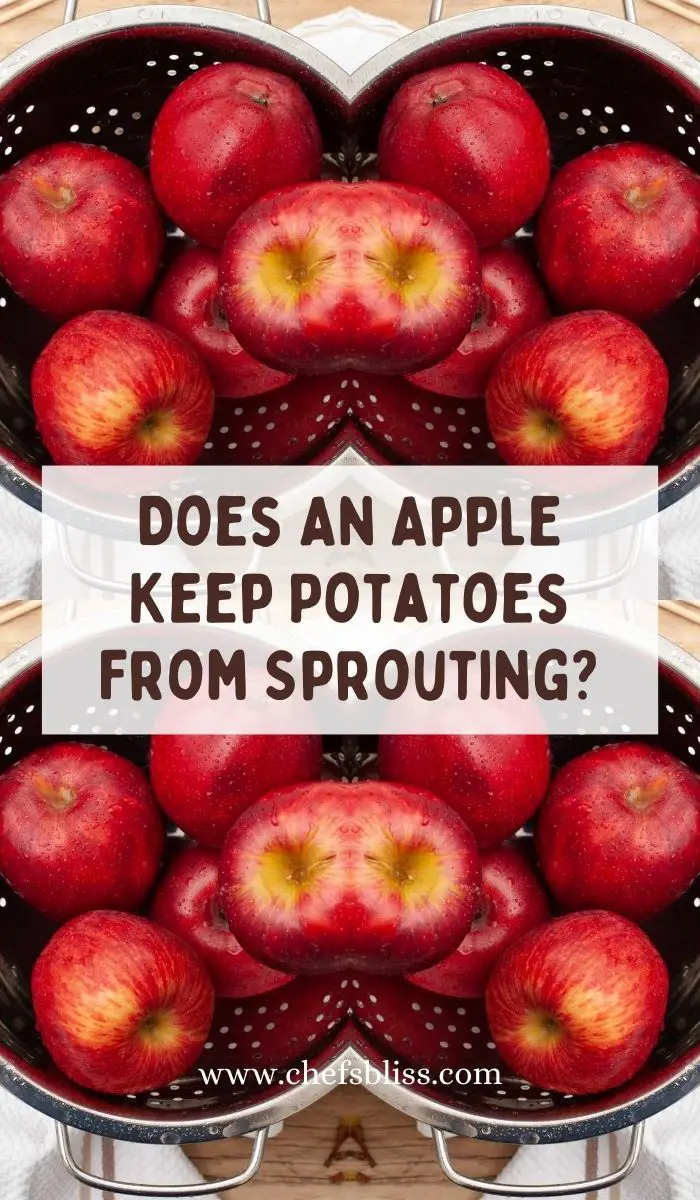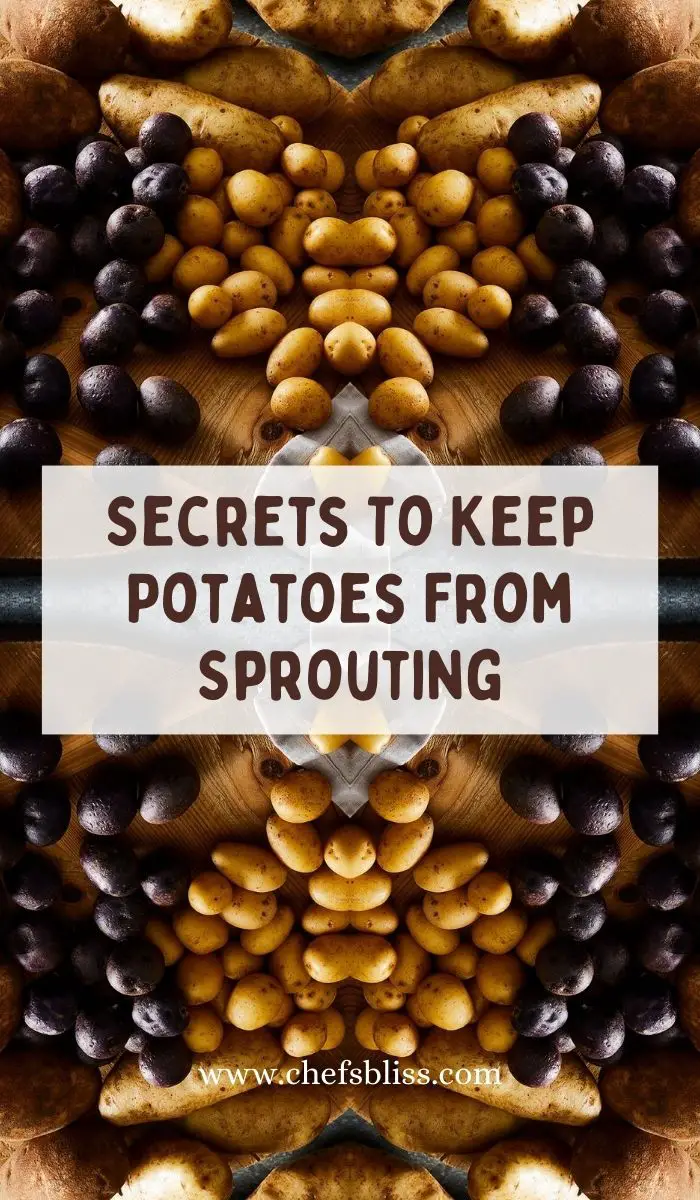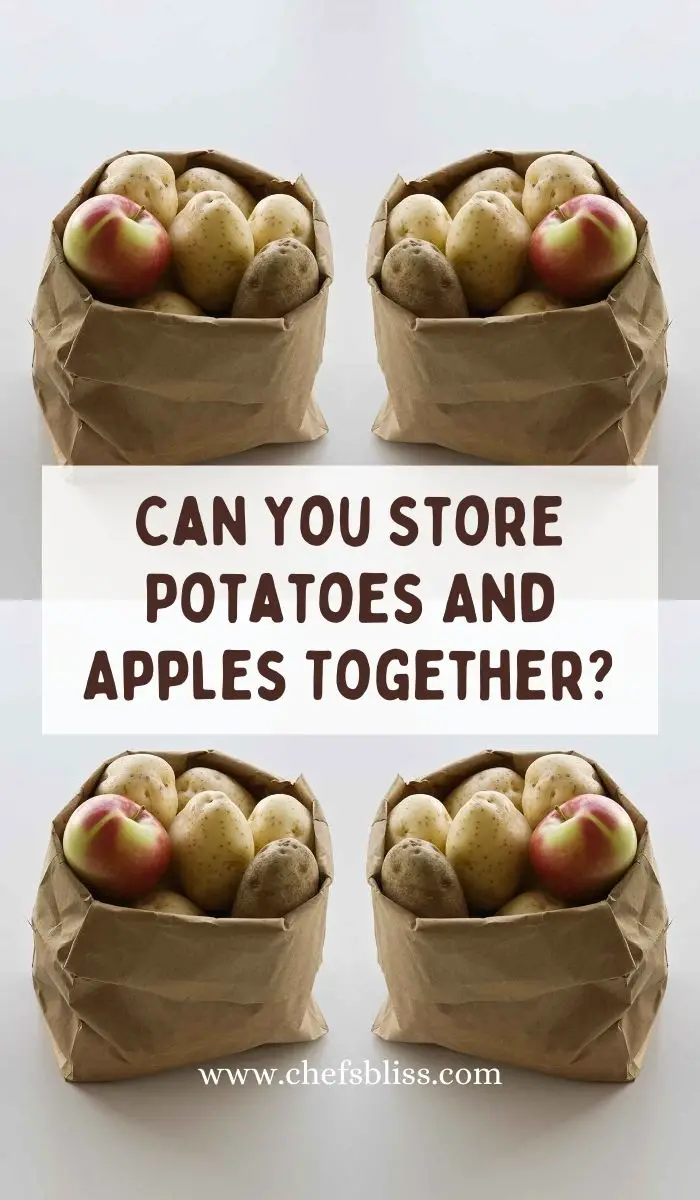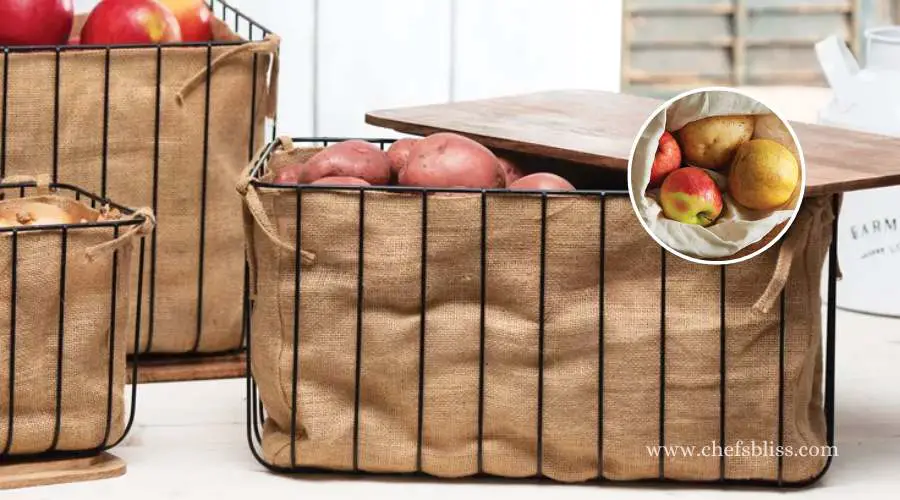Every product is independently reviewed and selected by our editors. If you buy something through our links, we may earn an affiliate commission at no extra cost to you.
In the world of kitchen wisdom, old wives’ tales and urban legends often find their way into our routines.
One such intriguing claim is that placing an apple alongside potatoes can prevent the latter from sprouting. But is this just a culinary myth or is there some truth behind it?
In this article, I will dive deep into the science to unravel the mystery behind whether an apple truly keeps potatoes from sprouting.
Does An Apple Keep Potatoes From Sprouting – Get The Answer
The belief that placing an apple with potatoes can prevent sprouting is a common household tip or anecdotal advice.

The idea behind this practice is that apples naturally release ethylene gas, a plant hormone that can inhibit sprouting in some fruits and vegetables.
However, the effectiveness of using an apple to prevent potato sprouting is not scientifically proven and remains a subject of debate.
While some individuals claim success with this method, others report no noticeable difference in sprouting when storing potatoes with apples.
Several factors, such as storage conditions, potato variety, and age, can influence sprouting, making it difficult to attribute the prevention solely to the presence of an apple.
For optimal potato storage, it is generally recommended to keep them in a cool, dark, and well-ventilated environment. Removing any sprouting or green portions can also help extend their shelf life.
While using an apple as a sprout prevention method might not be scientifically validated, proper storage practices can effectively minimize sprouting and keep your potatoes fresh for a longer time.
How To Keep Potatoes From Sprouting – Potatoes Storing Tips

To keep potatoes from sprouting and prolong their shelf life, you can follow these simple storage tips:
Store in a cool, dark place:
Potatoes should be kept in a cool, dark, and well-ventilated area, such as a pantry, cellar, or a cool corner of the kitchen.
Avoid storing them near sources of heat or direct sunlight, as this can lead to premature sprouting.
Avoid moisture:
Potatoes should be kept dry, as excess moisture can encourage sprouting and spoilage. Make sure they are free from any dampness before storing.
Use proper containers:
Use breathable containers like mesh bags, paper bags, or open baskets for storage.
These containers allow for better air circulation, which helps prevent the buildup of moisture around the potatoes.
Remove sprouts and green parts:
Check your potatoes regularly and remove any sprouts that may have started to grow.
Also, remove any green parts on the potatoes, as they contain a toxic substance called solanine.
Store away from onions:
Onions release gases that can accelerate sprouting in potatoes. Keep onions and potatoes in separate storage areas to prevent this.
Don’t store with fruits:
While the “apple with potatoes” method is a common practice, the effectiveness is uncertain.
To be safe, store potatoes away from other fruits, as some fruits release ethylene gas, which may promote sprouting in potatoes.
Consider refrigeration:
If you live in a warm and humid climate, or if your home lacks suitable cool storage options, you can store potatoes in the refrigerator. However, keep them in a paper bag or perforated plastic bag to prevent excess moisture buildup.
By following these storage guidelines and regularly inspecting your potatoes for any signs of sprouting, you can extend their shelf life and enjoy fresh, sprout-free potatoes for a longer period.
What Chemical To Prevent Potatoes From Sprouting
One common chemical used to prevent potatoes from sprouting is called “chlorpropham” (CIPC), which is a synthetic plant growth regulator.
It is widely used in the potato industry to inhibit sprouting during storage.
When applied to potatoes before or after harvest, CIPC penetrates the skin and inhibits the growth of sprouts by disrupting cell division.
However, it’s essential to note that the use of CIPC is regulated in many countries, and there may be restrictions or guidelines on its use to ensure food safety.
The maximum residue limits (MRLs) for CIPC on potatoes and other crops are monitored to ensure that they are within safe levels for human consumption.
If you are considering using any chemical sprout inhibitor on potatoes, it’s crucial to follow the instructions and guidelines provided by the product manufacturer and adhere to the regulations in your region.
Additionally, it’s worth exploring other natural and non-chemical methods of sprout prevention, as chemicals may not be suitable for home use or small-scale storage.
Storing potatoes in a cool, dark, and well-ventilated environment and removing any sprouts that develop are effective ways to prevent sprouting without the use of chemicals.
Can You Store Potatoes And Apples Together?
Yes, you can store potatoes and apples together, but there are a few important considerations to keep in mind.

As mentioned earlier, apples naturally release ethylene gas, which can inhibit sprouting in some fruits and vegetables, including potatoes.
Some people believe that storing apples with potatoes may help prevent sprouting.
However, the effectiveness of this method is not scientifically proven and remains a subject of debate.
If you decide to store potatoes and apples together, here are some tips to ensure the best storage conditions:
Use proper containers:
Store potatoes and apples in separate containers within the same storage area.
Use breathable containers like mesh bags, paper bags, or open baskets to allow for proper air circulation and prevent moisture buildup.
Regularly check for sprouting:
Even if you store them together, it’s essential to check your potatoes regularly for any signs of sprouting.
If you notice sprouts, remove them promptly to avoid affecting the quality of the other stored produce.
Avoid storing with other fruits:
While apples are commonly suggested for potential sprout prevention, avoid storing potatoes with other fruits, as some fruits release ethylene gas, which may promote sprouting in potatoes.
Keep the storage area cool and dark:
Both potatoes and apples prefer cool, dark environments. Make sure the storage area is well-ventilated and away from sources of heat or direct sunlight.
If you prefer to store potatoes separately from apples or other fruits, that is also a viable option.
Storing them in their own designated space with proper ventilation and temperature control can help maintain their freshness and reduce the risk of sprouting.
Is it true that placing an apple with potatoes prevents sprouting?
The belief that placing an apple with potatoes prevents sprouting is a common household tip or anecdotal advice.
However, there is limited scientific evidence to support this claim. While some people claim success with this method, it’s essential to consider other factors such as storage conditions, potato variety, and age.
How long can I expect my potatoes to remain sprout-free when stored with apples?
The duration for which potatoes remain sprout-free when stored with apples can vary.
It depends on several factors, including the freshness of the potatoes at the time of storage, the type of apple used, and the storage environment.
Generally, the apple’s ethylene gas may inhibit sprouting for a few weeks, but this can vary from one storage setting to another.
Are certain apple varieties more effective at inhibiting potato sprouting than others?
Some people claim that certain apple varieties, such as Granny Smith or Fuji, are more effective at inhibiting potato sprouting.
However, there is no substantial scientific evidence to confirm or refute this claim.
It is possible that different apple varieties release varying levels of ethylene gas, which could impact sprout prevention to some extent.
Can I use a sliced apple to achieve the same sprout-preventing effect with potatoes?
Slicing an apple may potentially increase the release of ethylene gas, which is believed to inhibit sprouting.
However, the efficacy of using a sliced apple for potato sprout prevention is still uncertain and largely based on anecdotal experiences.
Sliced or not, the apple’s impact on sprouting remains a subject of speculation.
Is there a specific way to position the apple within the potato storage to ensure effectiveness?
There is no established consensus on the specific positioning of the apple within the potato storage to ensure effectiveness.
Some suggest placing the apple among the potatoes, while others propose positioning it in a separate container within the storage area.
Experimentation and personal preference often guide the approach, as the efficacy of this method is not scientifically proven.
Does the size of the apple or potato have any impact on sprout prevention?
The size of the apple or potato is unlikely to have a significant impact on sprout prevention.
The effectiveness of using an apple to inhibit potato sprouting is primarily attributed to the ethylene gas released by the apple.
The amount of gas produced is relatively consistent regardless of the fruit or vegetable’s size.
Are there any potential negative effects on the apple or potato when stored together for an extended period?
There are generally no harmful effects on either the apple or potato when stored together for an extended period.
Apples naturally release ethylene gas during ripening, and this is a process that occurs in a wide range of fruit-ripening scenarios.
However, the impact of this method on the apple’s shelf life or quality, as well as any potential chemical interactions between the two, is not well-documented.
Can I use other fruits besides apples to keep my potatoes from sprouting?
While apples are the most commonly suggested fruit for sprout prevention, other fruits that produce ethylene gas, such as bananas or tomatoes, have been proposed as alternatives.
However, their effectiveness in inhibiting potato sprouting is uncertain and not widely supported by scientific research.
Is this apple and potato storage technique suitable for all potato varieties?
The apple and potato storage technique has been used with various potato varieties, but its effectiveness might differ depending on the specific potato type and its inherent sprouting characteristics.
Storing potatoes in a cool, dark, and well-ventilated environment remains the best practice to prolong their shelf life, regardless of the presence of an apple.

